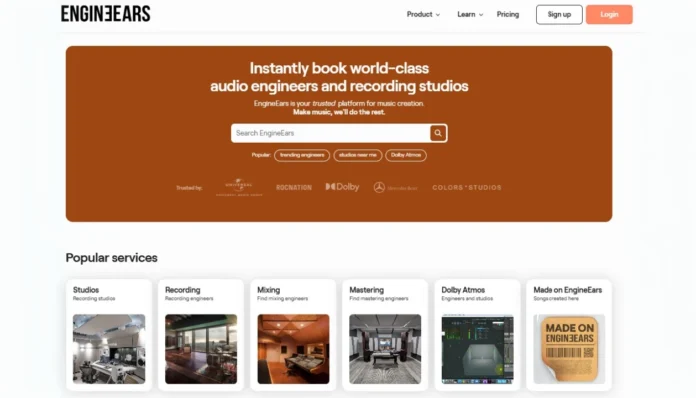When it comes to recording music, podcasts, or any other audio project, the right studio engineer can make all the difference. It’s one of those behind-the-scenes roles that often gets overlooked, but a talented studio engineer is just as important as the performer. Whether you’re a seasoned artist or a first-timer, choosing the right studio engineer will ensure your project sounds its best. Let’s explore how to find the perfect match for your recording needs.
What Exactly Does a Studio Engineer Do?
A studio engineer is responsible for managing the technical side of a recording session. From setting up microphones to mixing and mastering the final track, the engineer ensures that all the technical elements come together to create the best possible sound. They make sure that every detail is in place so that your recording is polished and professional.
But, the right studio engineer isn’t just someone who knows how to operate equipment—they also understand the artistic side of things. They need to know how to listen, understand the vision, and adapt their technical skills to achieve that vision.
Why Choosing the Right Studio Engineer Matters
You might wonder, why is it so important to choose the right studio engineer? The simple answer is that they’re the person who will take your raw sound and turn it into something ready for the world to hear. The engineer works behind the scenes to make sure your project sounds the way you want it to—crisp, clear, and full of emotion.
Here’s why the right engineer is essential:
- Technical Know-How: They know all the technical aspects of sound, from microphone placement to mixing and mastering. Without this expertise, your recording might not capture the full potential of the performance.
- Creative Input: The right studio engineer isn’t just someone who hits record. They’ll offer suggestions, help improve the sound, and work with you to ensure the recording matches your creative vision.
- Efficient Use of Time: Good engineers are efficient. They know how to set up quickly, troubleshoot issues on the spot, and keep the session moving forward. This allows you to get the most out of your time in the studio.
Key Factors to Look for in the Right Studio Engineer
So, how do you go about choosing the right studio engineer? There are a few key qualities that set the best engineers apart from the rest.
1. Knowledge and Experience
A great studio engineer needs to have both knowledge and experience. They should have a deep understanding of sound technology, as well as experience in the type of project you’re working on. Whether it’s music, voiceovers, or podcasts, an engineer with the right experience will know how to get the best sound for your particular genre or project.
Experience also brings problem-solving abilities. If something goes wrong in the middle of the session, a skilled engineer will know how to fix it without wasting time.
2. Communication Skills
Communication is key when you’re working on a recording project. The right studio engineer should be able to explain technical concepts in a way that’s easy to understand, and they should also listen to your needs. The goal is to create a space where you feel comfortable and confident enough to express your vision, and a good engineer will help facilitate that.
3. Flexibility and Adaptability
Every recording project is unique, so flexibility is crucial. The right studio engineer will be able to adapt to different genres, styles, and client preferences. Whether you’re recording acoustic guitar or electronic beats, they should be able to adjust their approach to match the sound you’re after.
4. Professionalism and Work Ethic
Professionalism goes beyond showing up on time. A studio engineer should be organized, punctual, and reliable. They need to respect your time and the creative process, ensuring that everything runs smoothly in the studio. A good work ethic also means staying focused, even when things get challenging.
5. Passion for Sound
While it’s not mandatory, a real passion for sound and music can make a big difference in the studio. A studio engineer who loves what they do will often go above and beyond to ensure the best result, offering creative insights and putting in the extra effort to perfect your recording.
How to Find the Right Studio Engineer for Your Project
Now that you know the qualities to look for, it’s time to find the right studio engineer. Here are a few ways you can start your search:
1. Research Local Studios
Start by looking at local recording studios and seeing who works there. Many studios list their engineers and their specialties on their websites. This can give you an idea of who might be the best fit for your project.
2. Ask for Referrals
One of the best ways to find a great studio engineer is through word of mouth. Ask fellow musicians, podcasters, or even friends who’ve worked in studios. Personal recommendations are often the most reliable.
3. Check Out Portfolios
Many engineers have online portfolios that showcase their past work. Listening to some of their previous projects can give you a feel for their style and technical ability. Pay attention to how well the sound is mixed and if it matches the kind of project you’re working on.
4. Set Up a Meeting
Once you’ve narrowed down your options, set up a meeting to discuss your project. This is a chance to see if you’re a good fit personality-wise and if the engineer understands your vision. You can also ask them about their approach and how they plan to handle your project.
5. Try a Test Session
If you’re still unsure, consider booking a short test session to see how the engineer works. This gives you the chance to see their skills in action and decide if you’re comfortable working with them before committing to a full recording.
Conclusion
Choosing the right studio engineer is crucial to making sure your recording project sounds as good as it can. The right engineer can bring technical skill, creative insight, and efficiency to your session, helping you achieve your artistic vision. When looking for the right studio engineer, focus on finding someone with experience, strong communication skills, flexibility, professionalism, and a genuine passion for sound. By doing your research and taking the time to find the best fit, you’ll set yourself up for a successful and enjoyable recording experience.





